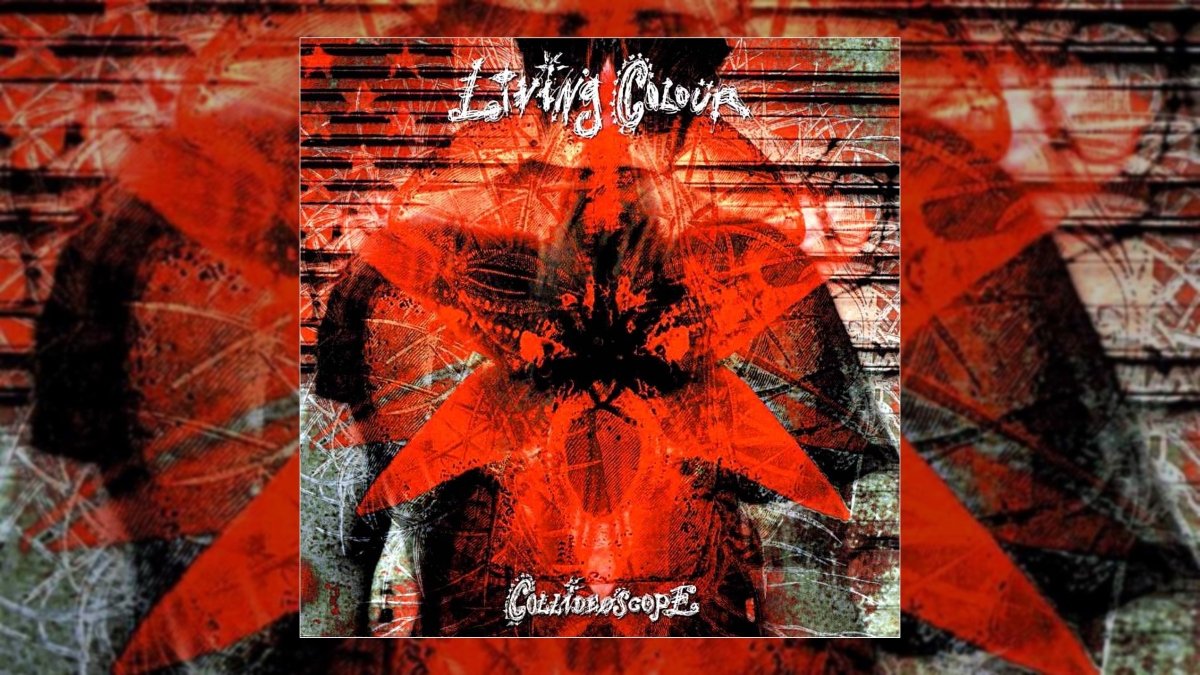Happy 20th Anniversary to Living Colour’s fourth studio album Collideøscope, originally released October 7, 2003.
After the trifecta of Vivid (1988), Time’s Up (1990) and Stain (1993), Living Colour announced that the power rock funk foursome was calling it a day in 1995, leaving the band’s faithful at a loss and pining for more. Cut to 10 years later and Living Colour announced their first studio release in a decade entitled Collideøscope.
For a band that always wrote from a socially conscious point of view, Living Colour returned with an album that reflected a changed worldview post the September 11th attacks two years earlier. Something that clearly hit home for this proud New York band.
Despite a decade between outings, Collideøscope picks up right where 1993’s Stain left off. The sound of Living Colour is raucous and attacking, filled with hard hitting beats and heavier distorted guitars. And time had not withered the power of Corey Glover’s vocals that soar with passion and questioning as he struggles to make sense of this new world.
Whilst it may be obvious that Living Colour’s message is held in the powerful lyrics, they also provide context in the music that accompanies it. Take a listen to the album opener “Song Without Sin” and as you are drawn to the commentary within the lyrics as Glover sings “If there’s someone out their without it / Let them cast the first stone / If there’s someone out their without sin / We can all go home,” you’ll notice the coda that merges heavy rock with world music and middle eastern melody and instruments. A powerful music comment that underpins that of the lyrics.
Songs like “A ? of When,” “Nightmare City” and “Operation: Mind Control” are deliberately disorienting and in parts threatening—harking back to the dread of Stain’s “Ausländer” whilst the blues-rock of “Holy Roller” and the rock-pop of “Great Expectations” shows the wide pallete of tones that Living Colour draw from.
This is true in the sonic experiments of the drum ‘n’ bass heavy “In Your Name” that highlights the twisting of God/Allah’s words to justify violent actions and the ethereal dub of album closer “Nova.”
Listen to the Album:
Padded out with a few covers in the guise of a blistering take on AC/DC’s “Back In Black” (can we call this a rock standard now?), a quick nod to Public Image Limited in “Choices Mash Up,” and an inventive reworking of The Beatles’ “Tomorrow Never Knows,” these little sidesteps can leave the album feeling a little disjointed.
But when things fall into focus is when the album and the band are at their finest. The updated pass at “Sacred Ground” (first released on the band’s 1995 Greatest Hits compilation Pride) has the song take on more energy and, in a post-9/11 landscape, feels even more pressing.
Similarly, the smooth and stripped back bliss of “Pocket of Tears” has Living Colour reminding us that when the distortion peddles and overdrive are turned off, the band is made up of four consummate musicians capable of writing anthems both broad and intimate.
The standout on the album (and somewhat unexpected given the lyrical content) is “Flying,” a song written from the perspective of someone inside the Twin Towers at the moment of impact. It’s stark. Raw. And powerfully emotional. The band doesn’t overplay it, hitting the right balance between somber, reflective and at times even optimistic. Glover again shows the emotion, power, and soul expressed through his vocals. This alone is worth the price of admission.
Living Colour have always been about 4 powerful musicians coming together to reflect the world they live in. And this is definitely true on Collideøscope—an album that lets each member shine without placing their counterparts in the shadows. Vernon Reid’s guitar playing is second to none as he wrangles complex runs with ease. Drummer Will Calhoun and bassist Doug Wimbish provide the backbone and punch to each track and remain the most solid of rhythm foundations in modern rock. And as noted, Glover’s vocals some of the finest he has ever put on record.
Whilst not perfect, Collideøscope showed that Living Colour were still willing to push and explore their sound and that they were still a much-needed ingredient in the musical landscape. It’s somewhat perplexing how this album didn’t even make a blip on the US charts despite critical acclaim. If you’re a fan of Living Colour, or a fan of music that is packed with emotion, then I encourage you to hunt it out and allow yourself to be open to what it reveals.
LISTEN:
Editor's note: this anniversary tribute was originally published in 2018 and has since been edited for accuracy and timeliness.

